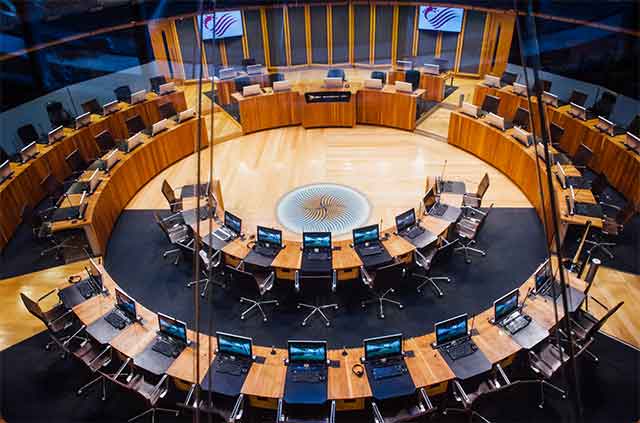Huge cuts to the performing arts could have a devastating impact, stifle the creative sector and endanger Wales’ cultural identity, a committee heard.
Sharon Stone, co-director of Chapter Arts Centre, described pressures on the sector as incredibly difficult following the pandemic, with inflation soaring and a cost-of-living crisis.
She pointed to a 45% increase in utility costs over the past two years coupled with a “huge” 43% cut in the latest round of Arts Council of Wales funding.
Ms Stone, who is also director of finance at the Cardiff arts centre, told the Senedd’s culture committee: “We’ve gone from close to £680,000 a year to £390,000 a year.”
She explained that the Arts Council provides around 18% of Chapter’s income, adding: “We can’t pass that onto our audiences … we’ll price ourselves out of the market.”
‘Whirlwind’
Her co-director Hannah Firth told the committee some costs, such as for hiring spaces, have had to be passed on, putting pressure on the wider sector.
Louise Miles-Payne, director of Creu Cymru, which champions the performing arts, echoed concerns about the Arts Council’s latest investment review.
“It’s a whirlwind of things all happening at the same time,” she warned.
Naomi Chiffi, director of collaboration at National Theatre Wales (NTW), said the charity is in a “unique and inevitable” position of having lost all its Arts Council funding in the last review.
“Even before that things were difficult and … we can’t expect audiences to pick up the tab,” she added, cautioning that it is becoming unsustainable for the sector.
Asked about the potential impact of any further Arts Council cuts, Ms Firth said it could have devastating effects and stifle the creative sector, particularly for early career artists.
‘Cultural identity’
Ms Miles-Payne warned the theatre sector is already close to closures, with threats to Blackwood Miners’ Institute and Merthyr Tydfil’s Redhouse centre having shut.
Ms Chiffi said: “It’s really important to remember that arts isn’t a luxury, it’s not a means of entertainment – it can’t just become the privilege of the few, it’s a right for all of us….
“It’s such a vital part of the nation’s cultural identity.”
Ms Chiffi said the national theatre company has been through “great stress”, with voluntary redundancies leaving four core members of staff and five project-funded staff.
She welcomed ring-fenced transition funding from the Arts Council and a Cardiff council grant that has helped NTW continue work with schools and young people.
She told the meeting on October 17 that the wider artistic programming of NTW has sadly had to be put on hold due to the Arts Council cuts.
‘Social change’
Labour’s Alun Davies asked to what extent the sector is in financial crisis due to austerity as opposed to failing to adapt well to changes in society.
Recognising social change, Ms Firth suggested it is a combination of the two.
“But it’s a hard financial fact that people can’t afford to go out in the way that they used to,” she said, adding that habits changed during the pandemic.
Ms Miles-Payne said the sector has faced a steady decline in funding for the past decade.
Mr Davies, a former minister, replied that it is fair to say the Welsh Government has not funded culture in the same way as Scotland or the Republic of Ireland.
Asked whether the Welsh Government cares about arts and culture – with suggestions the sector is an “easy target” for cuts – Ms Miles-Payne said: “It doesn’t really appear so.”
She told committee members that culture spending is 0.15% of the Welsh budget, compared with a European average of 1.5%.

